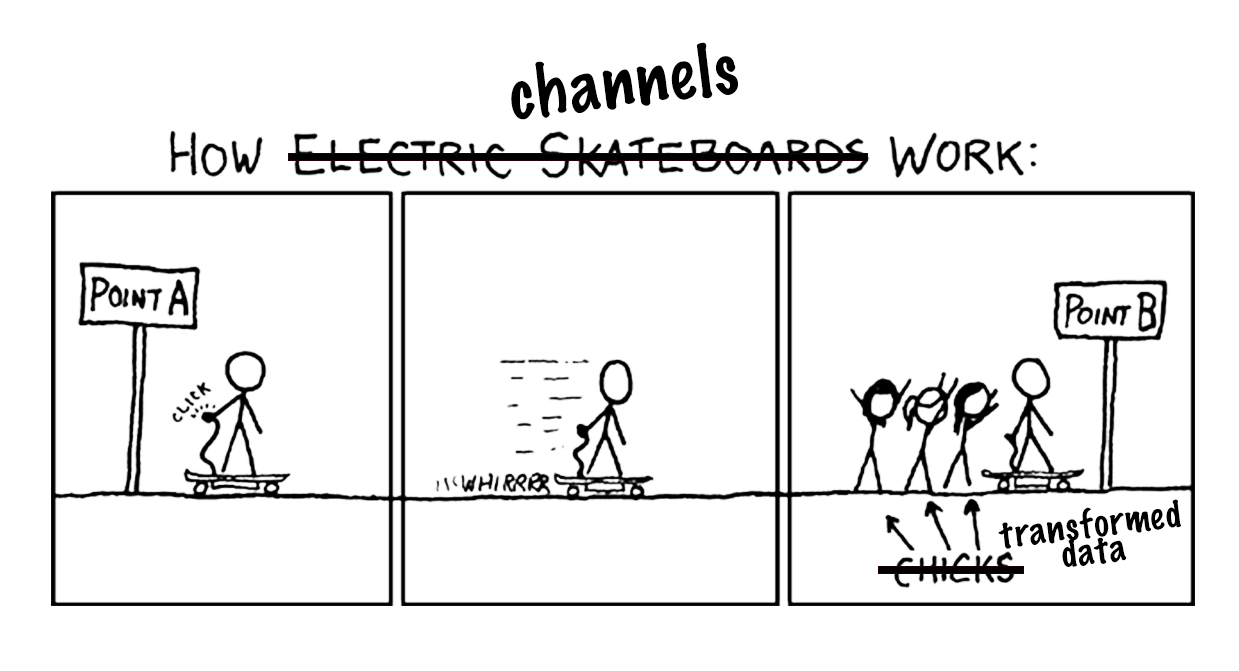component-channel
v0.0.2
Published
two sided event emitter with middleware
Downloads
4
Readme
channel
Event comes in here, event comes out there.

A channel is a two-sided event emitter with support for middleware. If you emit an event on the a side it will come out on the b side, and vice versa.
Basic Usage
var chan = channel();
chan.b.on('foo', function(thing) { console.log(thing) });
chan.a.emit('foo', 'thing');Outputs:
thingMiddleware and Data Transformation
Channels can operate on the data being transmitted through express-like middleware.
var chan = channel();
// uppercase middleware
chan.use(function(evt, next) {
evt.args = evt.args.map(function(str) { return str.toUpperCase() });
next();
});
chan.b.on('foo', function(thing) { console.log(thing) });
chan.a.emit('foo', 'thing');Outputs:
THINGMiddleware are executed asynchronously, so you can do interesting things like introducing latency or dropping events to simulate adverse network conditions locally.

Middleware parameters
The evt middleware parameter
evt contains the following properties:
source: the source endpoint. you can check if the event came fromaorb, by comparing this value withthis.aandthis.binside the middleware.name: the event nameargs: the event args
The next middleware parameter
Just call next() to propagate the event to the next middleware in the chain, or to emit the event if you're the last middleware.
To drop an event, simply return without calling next().
Applications of Middleware
Here are some applications of channel middleware:
- Simulating latency (component/channel-latency)
- Simulating packet loss (component/channel-drop)
- Debouncing events (component/channel-debounce)
- Batching events
- Filtering events
- Encrypting/decrypting data
- Encoding/decoding data
- Compressing/decompressing data
Piping in and out
You can use the pipeIn() and pipeOut() methods in the a and b endpoints to easily connect channels to event emitters, other channels or to something like socket.io.
This is useful, for example, for fanning in events from multiple sources into a single event emitter.
The pipe() method is also available when you want to simultaneously pipe events in and out.
Installation
Install with component(1):
$ component install component/channelAPI
channel()
Creates a new Channel.
Channel
Channel#a
The a Endpoint of the channel.
Channel#b
The b Endpoint of the channel.
Channel#use(middleware)
Use a middleware on this channel. middleware is a function, taking two parameters: evt and next.
Endpoint
Endpoint#emit(name, args...)
Emit an event with name and args. (It will fire on the other Endpoint, after going through the middleware);
Endpoint#on(name, fn)
Register fn as a handler function for event name.
Endpoint#pipeOut(name, target)
Pipe out name events into target. Target can be an Emitter, another Channel or anything that exposes an emit() method.
Endpoint#pipeIn(name, target)
Pipe in name events from target. Target can be an Emitter, another Channel or anything that exposes an on() method.
Endpoint#pipe(name, target)
Equivalent to calling both pipeOut() and pipeIn().
License
The MIT License (MIT)
Copyright (c) 2014 Automattic, Inc.
Permission is hereby granted, free of charge, to any person obtaining a copy of this software and associated documentation files (the "Software"), to deal in the Software without restriction, including without limitation the rights to use, copy, modify, merge, publish, distribute, sublicense, and/or sell copies of the Software, and to permit persons to whom the Software is furnished to do so, subject to the following conditions:
The above copyright notice and this permission notice shall be included in all copies or substantial portions of the Software.
THE SOFTWARE IS PROVIDED "AS IS", WITHOUT WARRANTY OF ANY KIND, EXPRESS OR IMPLIED, INCLUDING BUT NOT LIMITED TO THE WARRANTIES OF MERCHANTABILITY, FITNESS FOR A PARTICULAR PURPOSE AND NONINFRINGEMENT. IN NO EVENT SHALL THE AUTHORS OR COPYRIGHT HOLDERS BE LIABLE FOR ANY CLAIM, DAMAGES OR OTHER LIABILITY, WHETHER IN AN ACTION OF CONTRACT, TORT OR OTHERWISE, ARISING FROM, OUT OF OR IN CONNECTION WITH THE SOFTWARE OR THE USE OR OTHER DEALINGS IN THE SOFTWARE.
